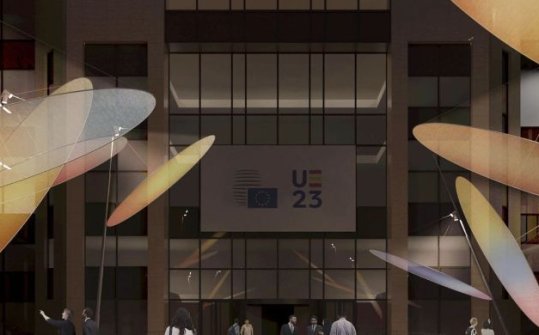Through a series of remarkable Spanish short films, we embark on a cinematic journey that celebrates the profound significance of architecture in our lives. In Aguaespejo Granadino (1955), Val del Omar's visionary camera transports us to the mystical gardens and palaces of the Alhambra, where innovative techniques capture the essence of Granada's unique architecture. León Siminiani’s Arquitectura Emocional (2023) blurs the boundaries of documentary and fiction, revealing how architecture extends beyond mere facades, shaping the narratives of love in Madrid's neighbourhoods. In Querida A. (2023), Elena Molina sheds light on the unnoticed lives that exist within Barcelona’s architectural tapestry.
Aguaespejo Granadino (1955)
In Vibración de Granada (1935), a twenty-minute film with the Alhambra as the protagonist, we can already identify some of the features of Val del Omar’s cinema he would develop in his essential Tríptico Elemental de España, a series of three films of twenty minutes each in which technical experimentation and lyricism reign in equal parts. Aguaespejo Granadino, or La Gran Seguiriya, shot between 1953 and 1955, begins the Valdelomarian trilogy. Val del Omar’s camera guides us through the gardens and palaces of the Alhambra by utilizing pioneering zoom techniques. The landscapes of Granada are captured from different points of view, always accompanied by an innovative sound design. With the unique architecture of Granada in the background, Aguaespejo Granadino stands as one of the most mystical pieces of Val del Omar's filmography.
Photographer by trade, Val del Omar (Granada, 1904 - Madrid, 1982) pursued his passion as an audiovisual inventor. Today, Val del Omar is best known for his films, considered by many experts as “total works of art”. Fascinated by cinema, he always considered himself a cinematographer rather than a filmmaker. As such, he had little to do with the conventions of the mass film industry of the 1930s. Reflecting the non-market aspirations of its author, Valdelomarian cinema was to express itself in other terms.
Arquitectura Emocional 1959 (2023)
In Arquitectura Emocional 1959, between documentary and fiction, we are invited to walk the streets of different neighborhoods of Madrid through the love story of Sebas and Andrea, two students of Philosophy and Letters who meet during the academic year 58-59. A relationship marked by their social class differences and their different ways of looking at life. The characters are conceived as figures in an architectural model but, as the film progresses, they claim their own space. Arquitectura Emocional 1959 reveals an architecture that goes beyond the facade.
Elías León Siminiani (Santander, Cantabria, 1971) is a Spanish screenwriter, director and film producer. His feature film career began in 2012 with his first film, Mapa, which received several awards, such as Best European Documentary at the 2012 Seville European Film Festival. Nevertheless, his career as a short filmmaker is undoubtedly the most extensive. A trajectory that has been deservedly recognized by winning the 2023 Goya Best Fiction Short Award with Arquitectura Emocional 1959.
Querida A.
In a world characterized by excessive control and constant connectivity, every action we take appears to leave a mark. However, there are individuals whose lives remain unnoticed, lingering beneath the surface of visibility. A., for instance, has been dwelling on the streets of Barcelona for five years, devoid of official documents or a permanent residence. Her family has been unable to find her until a significant turning point occurs with a Facebook message. This visually evocative piece contemplates the contemporary city of Barcelona and its enigmatic spaces that escape our attention.
Elena Molina (Madrid, 1986) began her career directing short documentaries, namely Yungay 7020 (2021), All I Need is a Ball (2020), and Laatash (2019), that garnered recognition at numerous international festivals. In 2023 she has directed Querida A., a piece for “City Symphonies", a programme created by the CCCB and endorsed by the collective Dones Visuals that aims to analyze and see urban space through the personal itineraries of different filmmakers.


